The Liberal Age 1851-1914 Reforms, Parties, Political Life

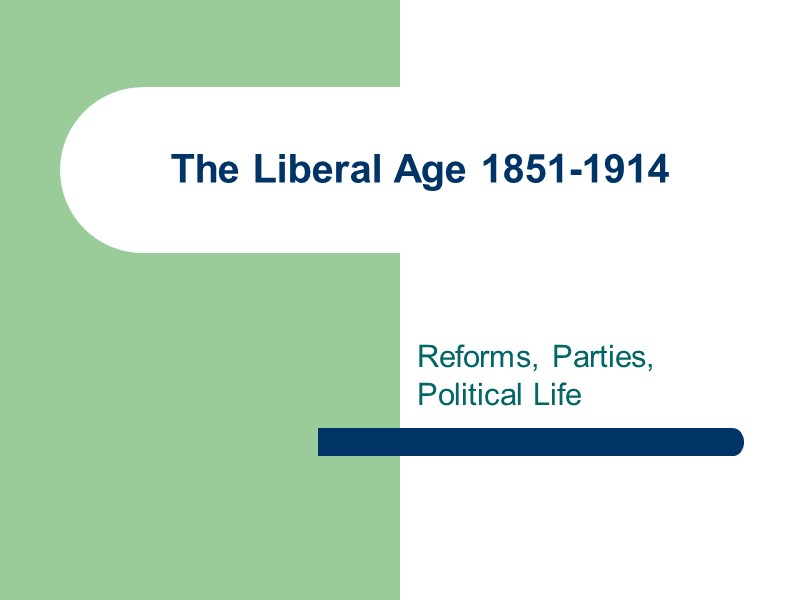
The Liberal Age 1851-1914 Reforms, Parties, Political Life
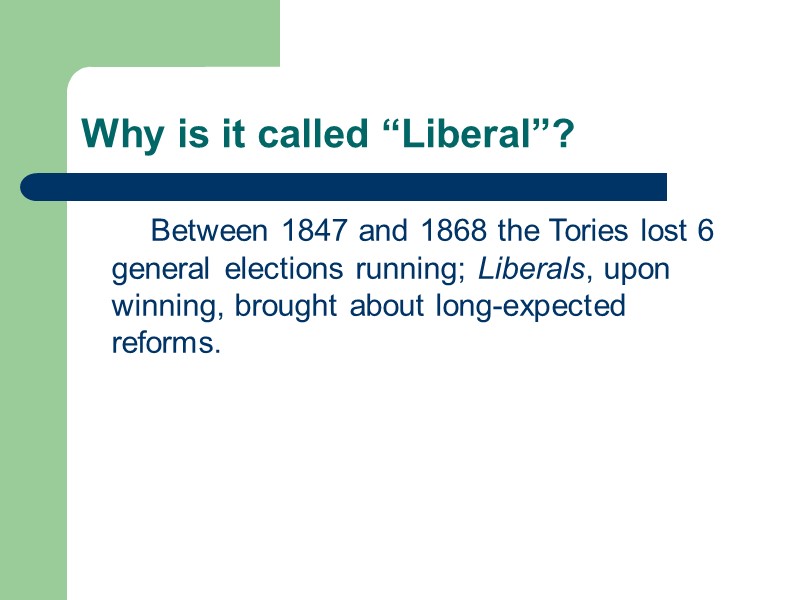
Why is it called “Liberal”? Between 1847 and 1868 the Tories lost 6 general elections running; Liberals, upon winning, brought about long-expected reforms.
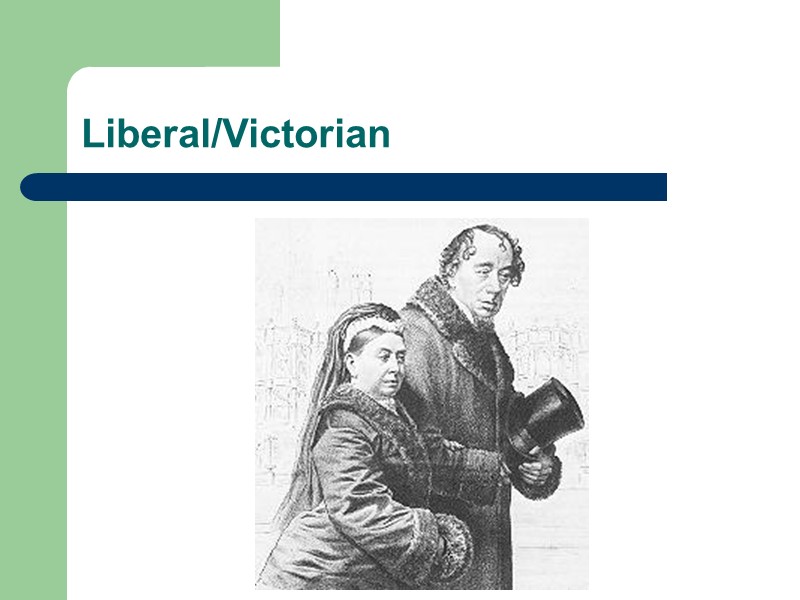
Liberal/Victorian
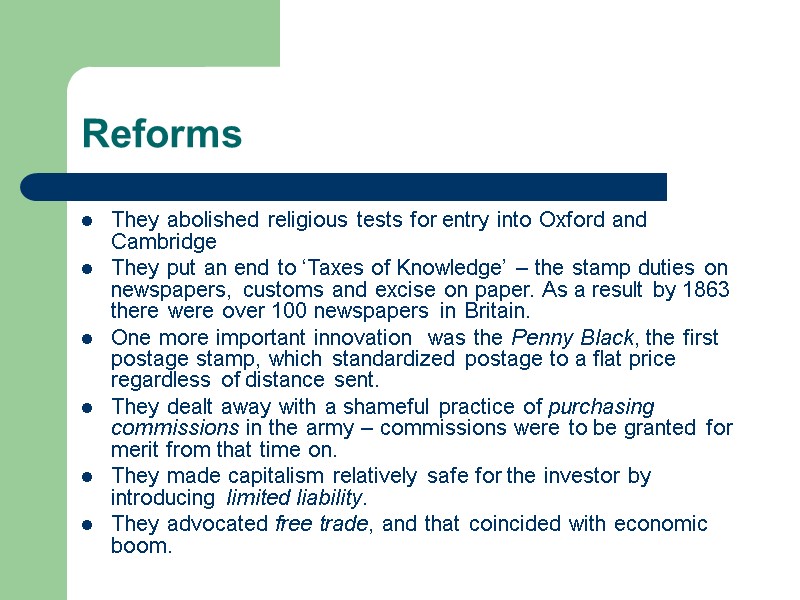
Reforms They abolished religious tests for entry into Oxford and Cambridge They put an end to ‘Taxes of Knowledge’ – the stamp duties on newspapers, customs and excise on paper. As a result by 1863 there were over 100 newspapers in Britain. One more important innovation was the Penny Black, the first postage stamp, which standardized postage to a flat price regardless of distance sent. They dealt away with a shameful practice of purchasing commissions in the army – commissions were to be granted for merit from that time on. They made capitalism relatively safe for the investor by introducing limited liability. They advocated free trade, and that coincided with economic boom.
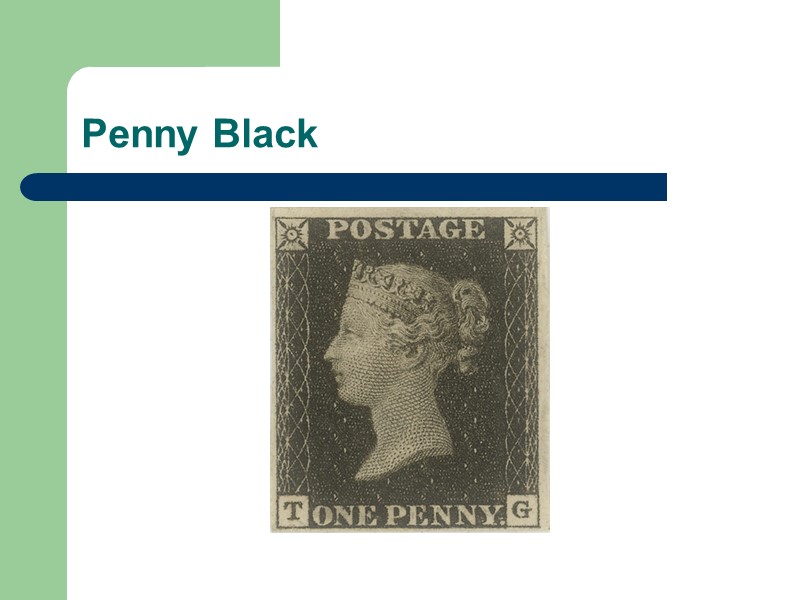
Penny Black
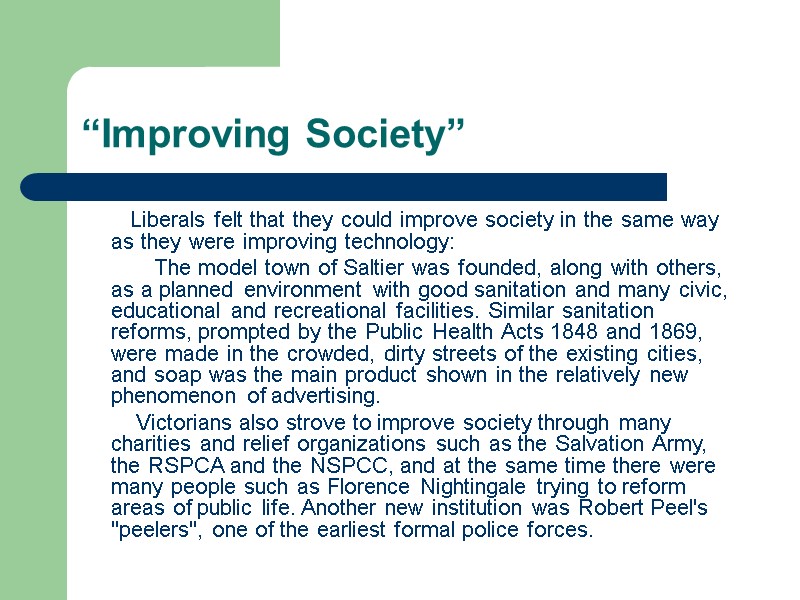
“Improving Society” Liberals felt that they could improve society in the same way as they were improving technology: The model town of Saltier was founded, along with others, as a planned environment with good sanitation and many civic, educational and recreational facilities. Similar sanitation reforms, prompted by the Public Health Acts 1848 and 1869, were made in the crowded, dirty streets of the existing cities, and soap was the main product shown in the relatively new phenomenon of advertising. Victorians also strove to improve society through many charities and relief organizations such as the Salvation Army, the RSPCA and the NSPCC, and at the same time there were many people such as Florence Nightingale trying to reform areas of public life. Another new institution was Robert Peel's "peelers", one of the earliest formal police forces.
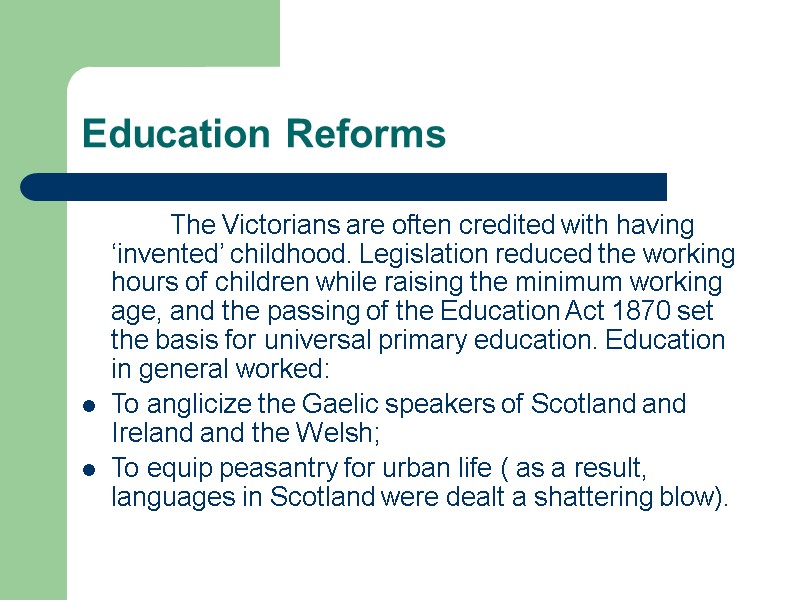
Education Reforms The Victorians are often credited with having ‘invented’ childhood. Legislation reduced the working hours of children while raising the minimum working age, and the passing of the Education Act 1870 set the basis for universal primary education. Education in general worked: To anglicize the Gaelic speakers of Scotland and Ireland and the Welsh; To equip peasantry for urban life ( as a result, languages in Scotland were dealt a shattering blow).
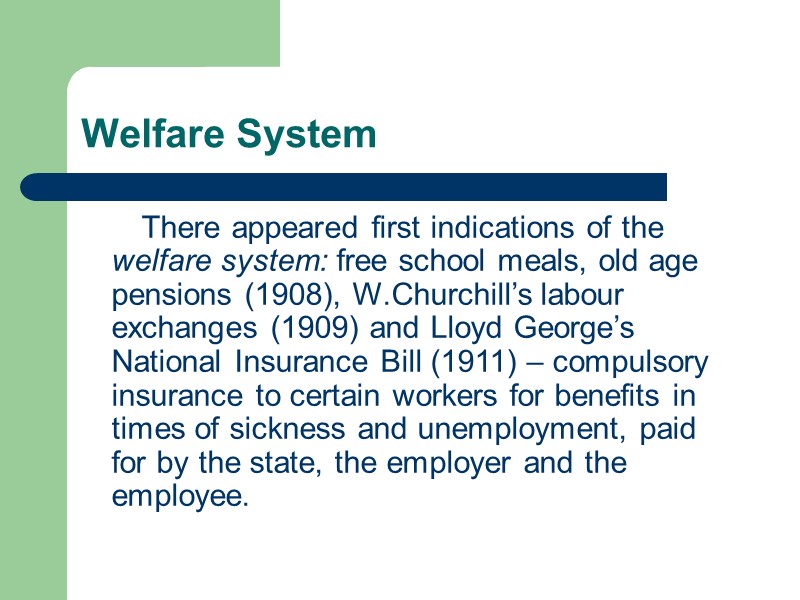
Welfare System There appeared first indications of the welfare system: free school meals, old age pensions (1908), W.Churchill’s labour exchanges (1909) and Lloyd George’s National Insurance Bill (1911) – compulsory insurance to certain workers for benefits in times of sickness and unemployment, paid for by the state, the employer and the employee.
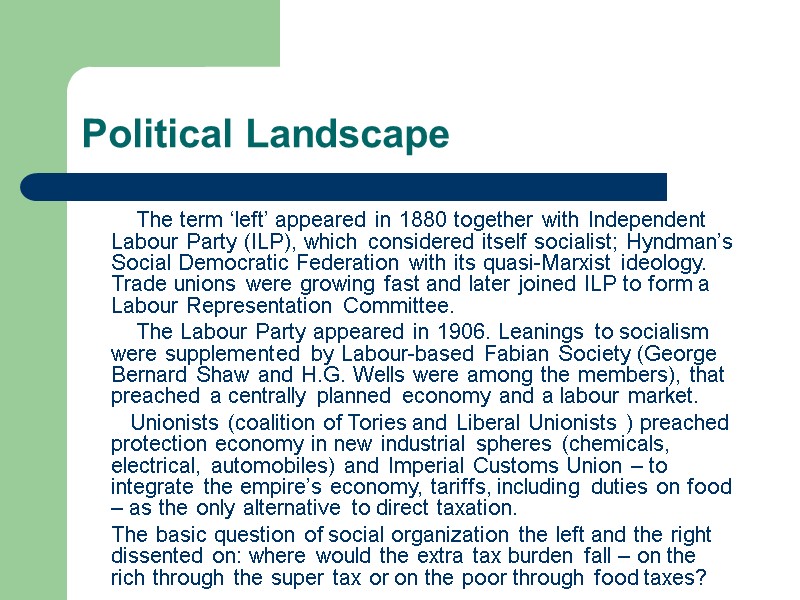
Political Landscape The term ‘left’ appeared in 1880 together with Independent Labour Party (ILP), which considered itself socialist; Hyndman’s Social Democratic Federation with its quasi-Marxist ideology. Trade unions were growing fast and later joined ILP to form a Labour Representation Committee. The Labour Party appeared in 1906. Leanings to socialism were supplemented by Labour-based Fabian Society (George Bernard Shaw and H.G. Wells were among the members), that preached a centrally planned economy and a labour market. Unionists (coalition of Tories and Liberal Unionists ) preached protection economy in new industrial spheres (chemicals, electrical, automobiles) and Imperial Customs Union – to integrate the empire’s economy, tariffs, including duties on food – as the only alternative to direct taxation. The basic question of social organization the left and the right dissented on: where would the extra tax burden fall – on the rich through the super tax or on the poor through food taxes?
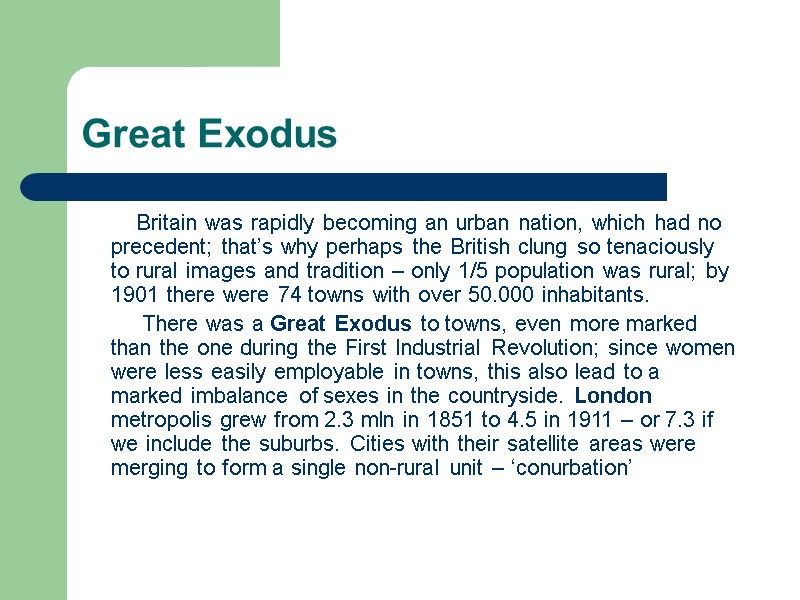
Great Exodus Britain was rapidly becoming an urban nation, which had no precedent; that’s why perhaps the British clung so tenaciously to rural images and tradition – only 1/5 population was rural; by 1901 there were 74 towns with over 50.000 inhabitants. There was a Great Exodus to towns, even more marked than the one during the First Industrial Revolution; since women were less easily employable in towns, this also lead to a marked imbalance of sexes in the countryside. London metropolis grew from 2.3 mln in 1851 to 4.5 in 1911 – or 7.3 if we include the suburbs. Cities with their satellite areas were merging to form a single non-rural unit – ‘conurbation’
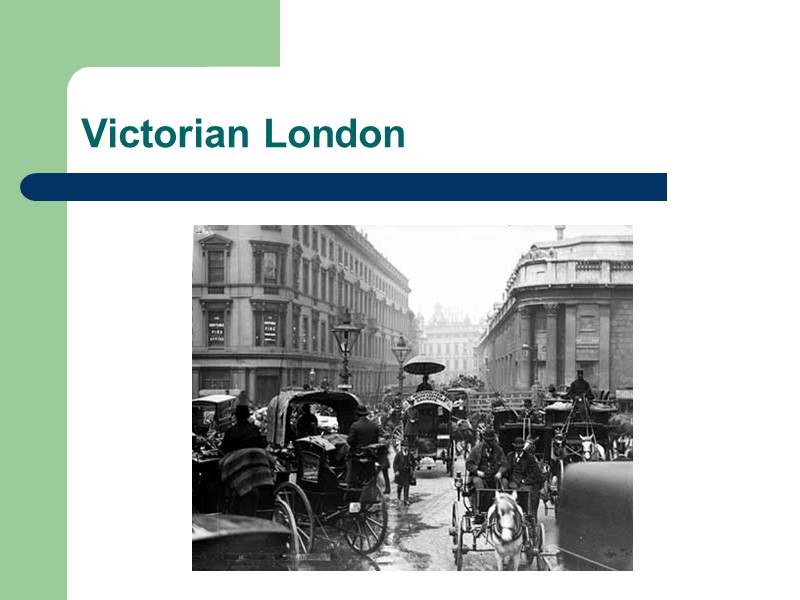
Victorian London
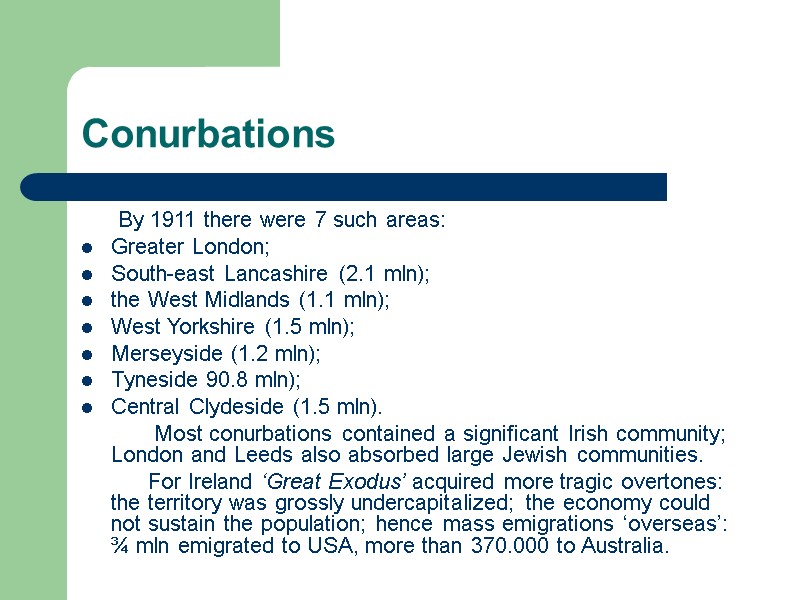
Conurbations By 1911 there were 7 such areas: Greater London; South-east Lancashire (2.1 mln); the West Midlands (1.1 mln); West Yorkshire (1.5 mln); Merseyside (1.2 mln); Tyneside 90.8 mln); Central Clydeside (1.5 mln). Most conurbations contained a significant Irish community; London and Leeds also absorbed large Jewish communities. For Ireland ‘Great Exodus’ acquired more tragic overtones: the territory was grossly undercapitalized; the economy could not sustain the population; hence mass emigrations ‘overseas’: ¾ mln emigrated to USA, more than 370.000 to Australia.
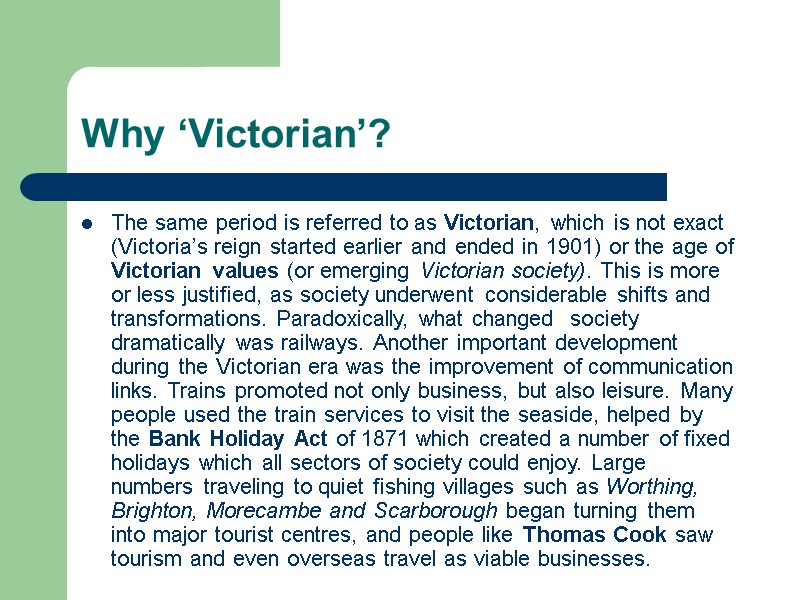
Why ‘Victorian’? The same period is referred to as Victorian, which is not exact (Victoria’s reign started earlier and ended in 1901) or the age of Victorian values (or emerging Victorian society). This is more or less justified, as society underwent considerable shifts and transformations. Paradoxically, what changed society dramatically was railways. Another important development during the Victorian era was the improvement of communication links. Trains promoted not only business, but also leisure. Many people used the train services to visit the seaside, helped by the Bank Holiday Act of 1871 which created a number of fixed holidays which all sectors of society could enjoy. Large numbers traveling to quiet fishing villages such as Worthing, Brighton, Morecambe and Scarborough began turning them into major tourist centres, and people like Thomas Cook saw tourism and even overseas travel as viable businesses.
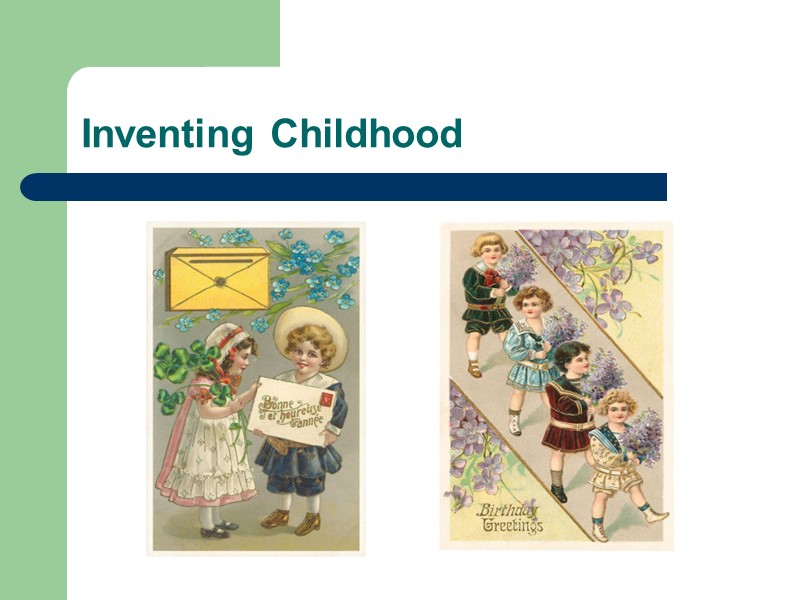
Inventing Childhood
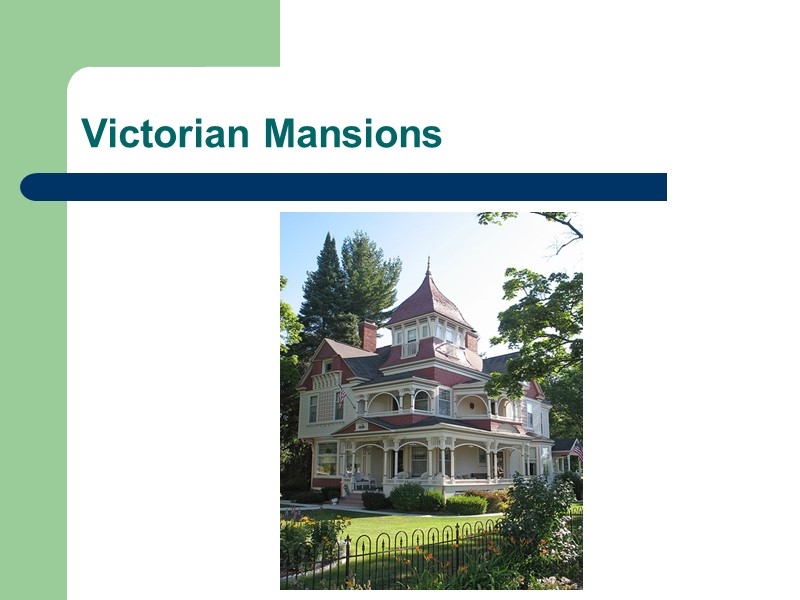
Victorian Mansions
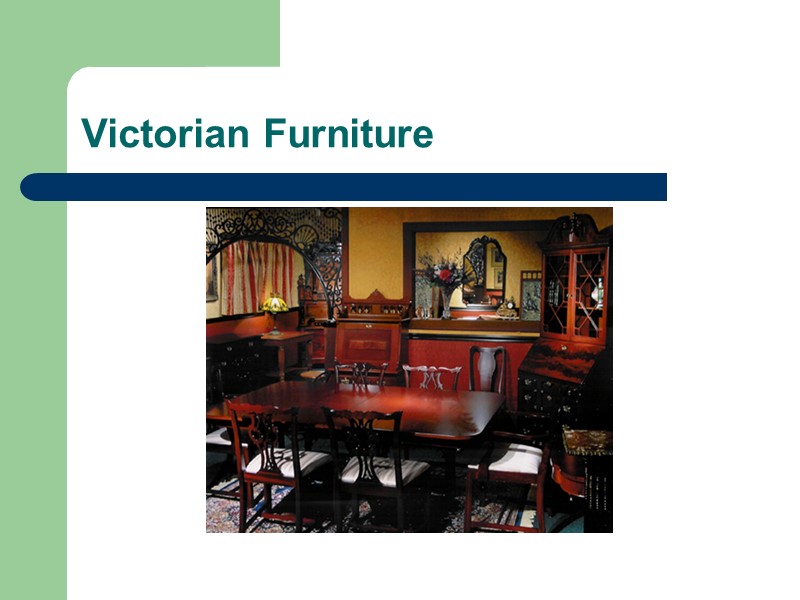
Victorian Furniture
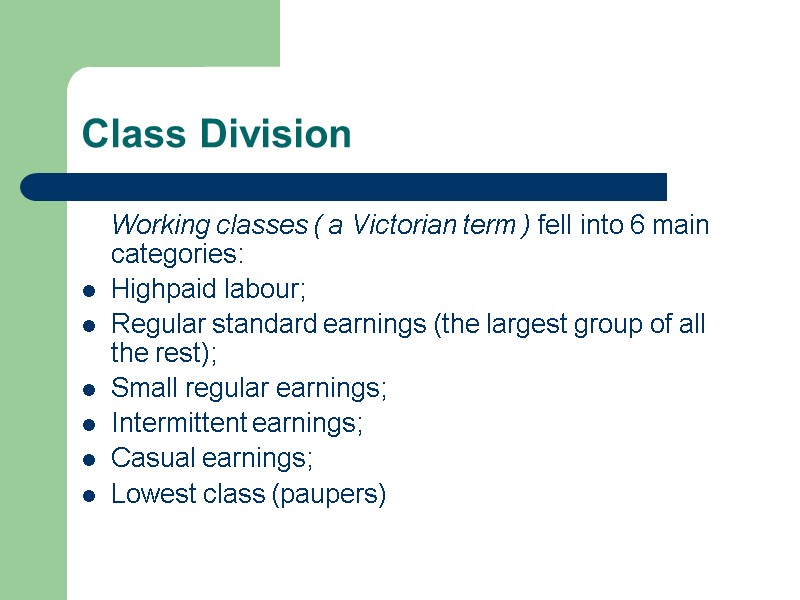
Class Division Working classes ( a Victorian term ) fell into 6 main categories: Highpaid labour; Regular standard earnings (the largest group of all the rest); Small regular earnings; Intermittent earnings; Casual earnings; Lowest class (paupers)
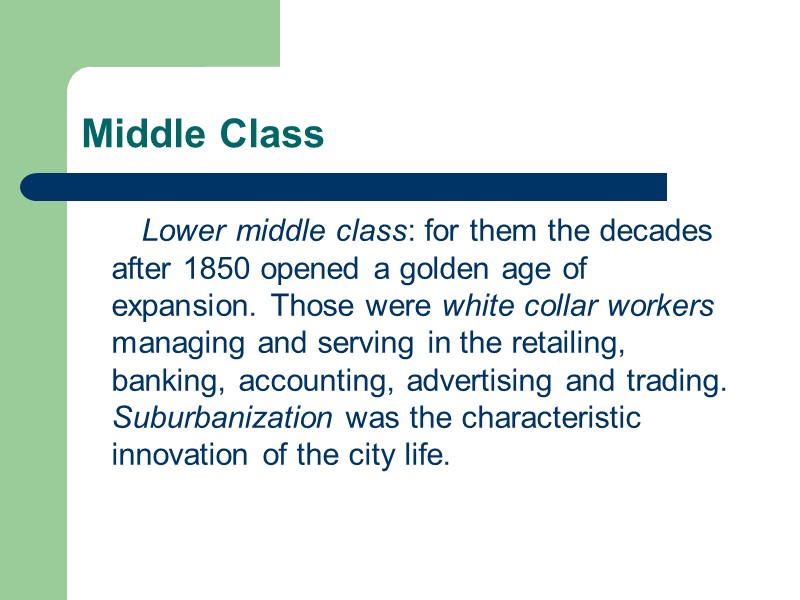
Middle Class Lower middle class: for them the decades after 1850 opened a golden age of expansion. Those were white collar workers managing and serving in the retailing, banking, accounting, advertising and trading. Suburbanization was the characteristic innovation of the city life.
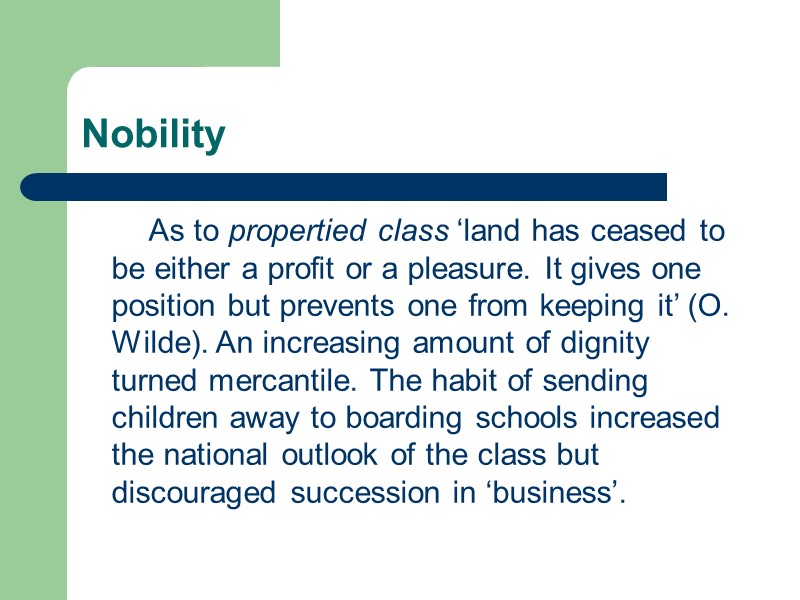
Nobility As to propertied class ‘land has ceased to be either a profit or a pleasure. It gives one position but prevents one from keeping it’ (O. Wilde). An increasing amount of dignity turned mercantile. The habit of sending children away to boarding schools increased the national outlook of the class but discouraged succession in ‘business’.
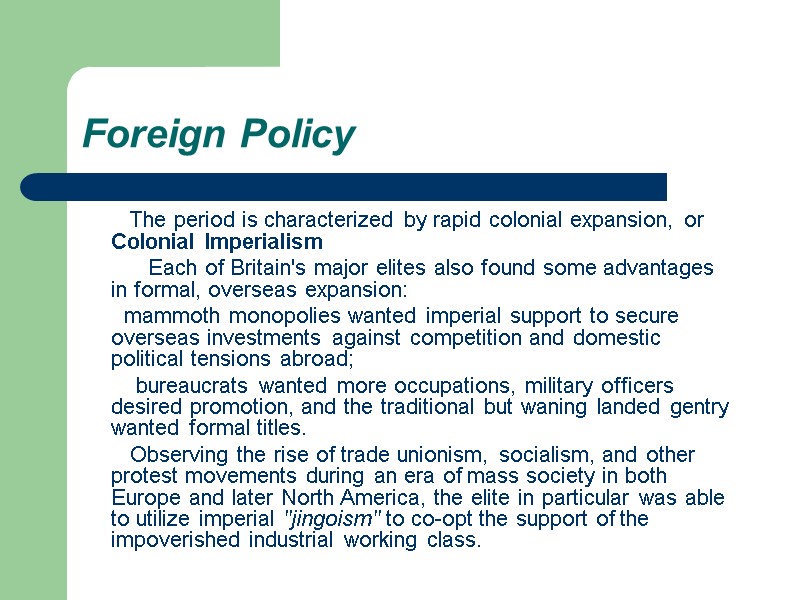
Foreign Policy The period is characterized by rapid colonial expansion, or Colonial Imperialism Each of Britain's major elites also found some advantages in formal, overseas expansion: mammoth monopolies wanted imperial support to secure overseas investments against competition and domestic political tensions abroad; bureaucrats wanted more occupations, military officers desired promotion, and the traditional but waning landed gentry wanted formal titles. Observing the rise of trade unionism, socialism, and other protest movements during an era of mass society in both Europe and later North America, the elite in particular was able to utilize imperial "jingoism" to co-opt the support of the impoverished industrial working class.
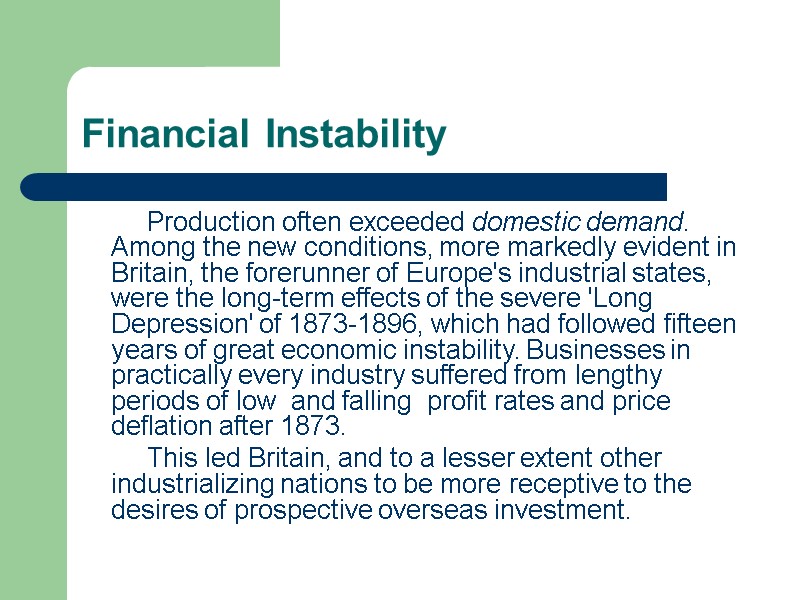
Financial Instability Production often exceeded domestic demand. Among the new conditions, more markedly evident in Britain, the forerunner of Europe's industrial states, were the long-term effects of the severe 'Long Depression' of 1873-1896, which had followed fifteen years of great economic instability. Businesses in practically every industry suffered from lengthy periods of low and falling profit rates and price deflation after 1873. This led Britain, and to a lesser extent other industrializing nations to be more receptive to the desires of prospective overseas investment.
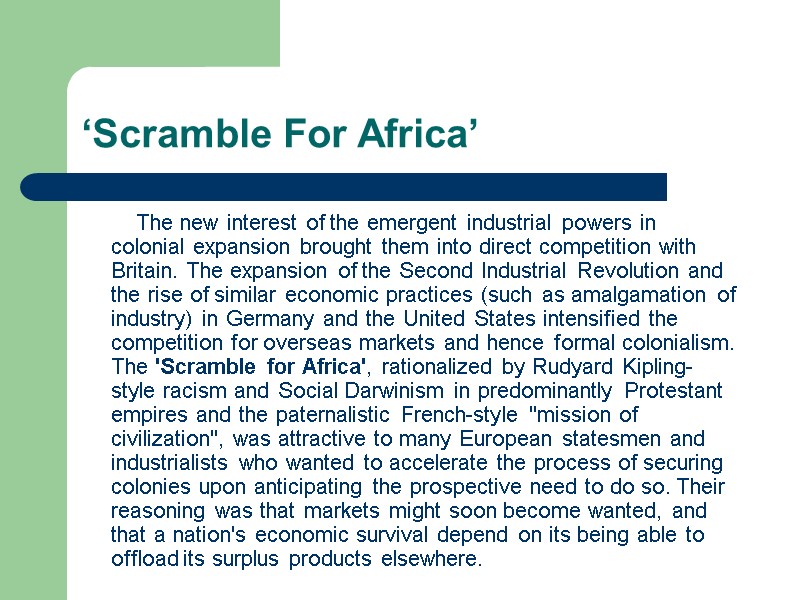
‘Scramble For Africa’ The new interest of the emergent industrial powers in colonial expansion brought them into direct competition with Britain. The expansion of the Second Industrial Revolution and the rise of similar economic practices (such as amalgamation of industry) in Germany and the United States intensified the competition for overseas markets and hence formal colonialism. The 'Scramble for Africa', rationalized by Rudyard Kipling-style racism and Social Darwinism in predominantly Protestant empires and the paternalistic French-style "mission of civilization", was attractive to many European statesmen and industrialists who wanted to accelerate the process of securing colonies upon anticipating the prospective need to do so. Their reasoning was that markets might soon become wanted, and that a nation's economic survival depend on its being able to offload its surplus products elsewhere.
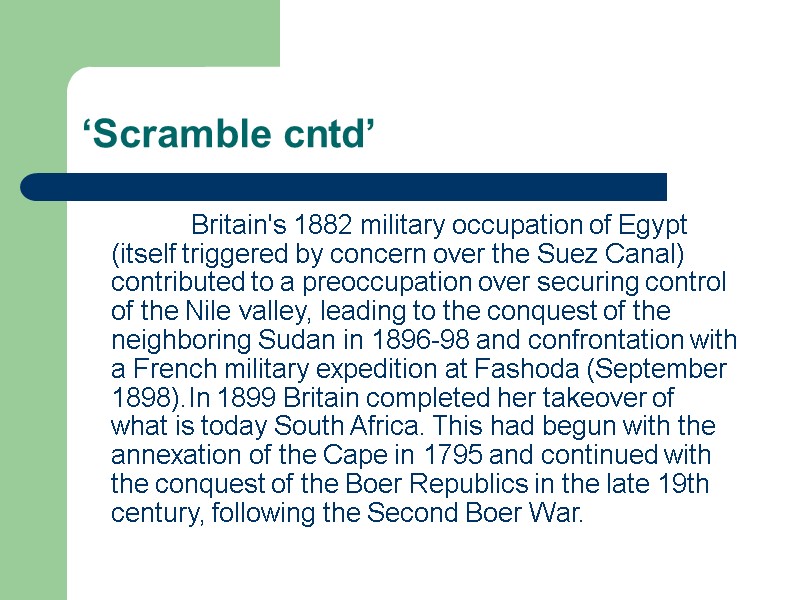
‘Scramble cntd’ Britain's 1882 military occupation of Egypt (itself triggered by concern over the Suez Canal) contributed to a preoccupation over securing control of the Nile valley, leading to the conquest of the neighboring Sudan in 1896-98 and confrontation with a French military expedition at Fashoda (September 1898).In 1899 Britain completed her takeover of what is today South Africa. This had begun with the annexation of the Cape in 1795 and continued with the conquest of the Boer Republics in the late 19th century, following the Second Boer War.
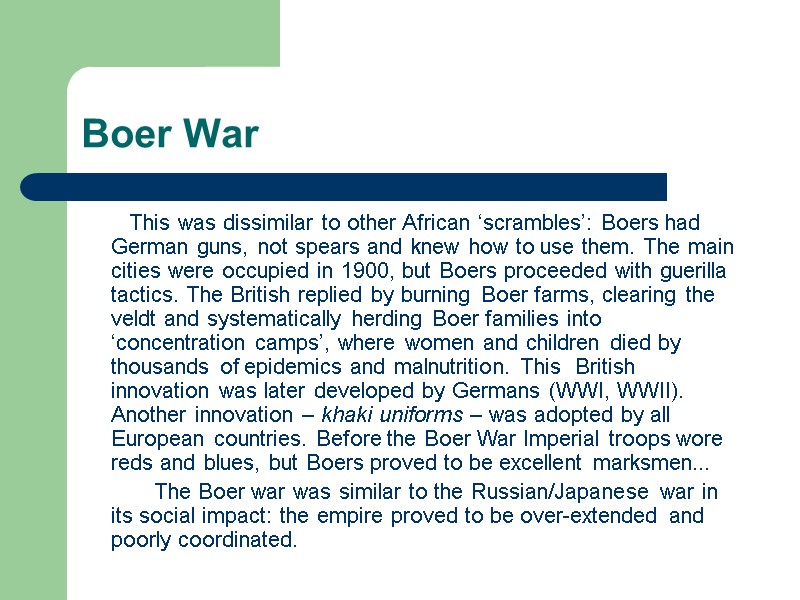
Boer War This was dissimilar to other African ‘scrambles’: Boers had German guns, not spears and knew how to use them. The main cities were occupied in 1900, but Boers proceeded with guerilla tactics. The British replied by burning Boer farms, clearing the veldt and systematically herding Boer families into ‘concentration camps’, where women and children died by thousands of epidemics and malnutrition. This British innovation was later developed by Germans (WWI, WWII). Another innovation – khaki uniforms – was adopted by all European countries. Before the Boer War Imperial troops wore reds and blues, but Boers proved to be excellent marksmen... The Boer war was similar to the Russian/Japanese war in its social impact: the empire proved to be over-extended and poorly coordinated.
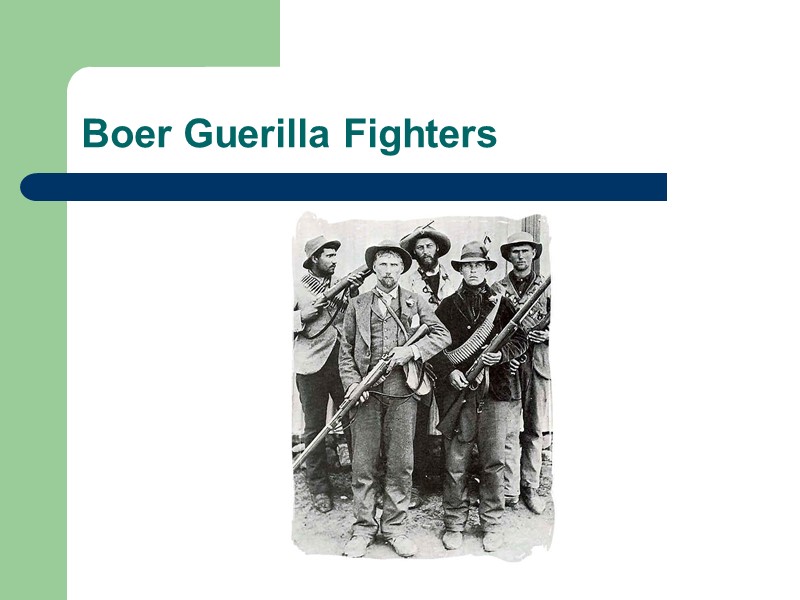
Boer Guerilla Fighters
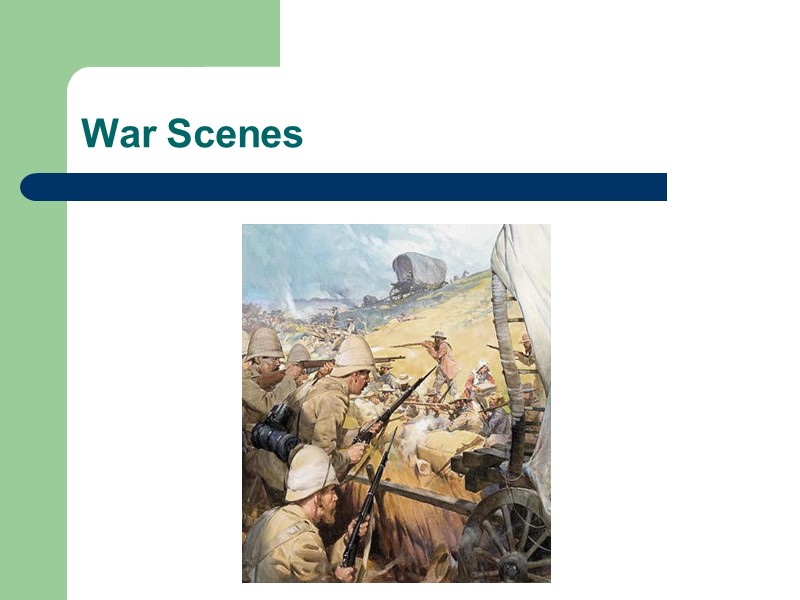
War Scenes
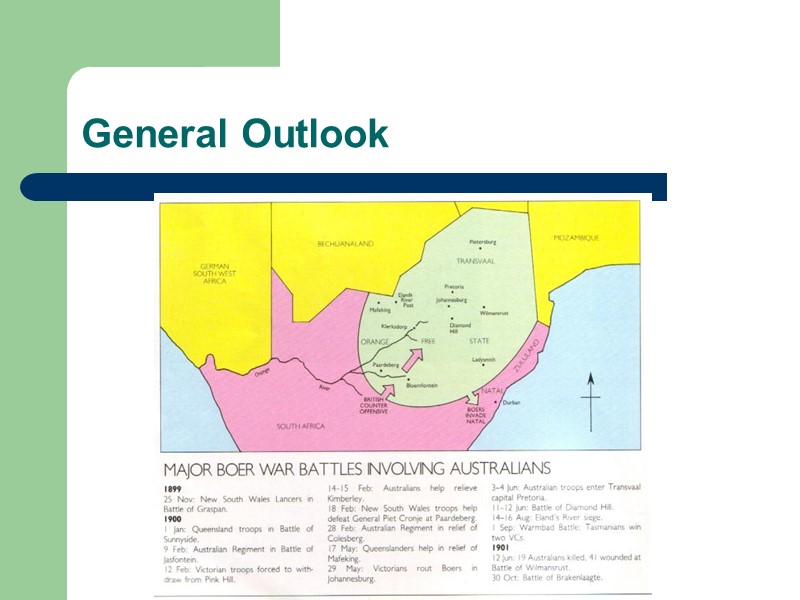
General Outlook
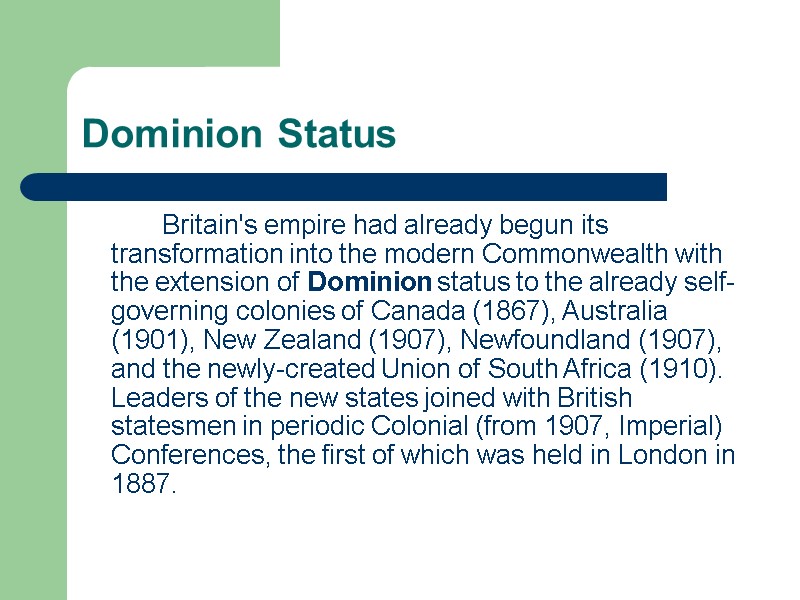
Dominion Status Britain's empire had already begun its transformation into the modern Commonwealth with the extension of Dominion status to the already self-governing colonies of Canada (1867), Australia (1901), New Zealand (1907), Newfoundland (1907), and the newly-created Union of South Africa (1910). Leaders of the new states joined with British statesmen in periodic Colonial (from 1907, Imperial) Conferences, the first of which was held in London in 1887.
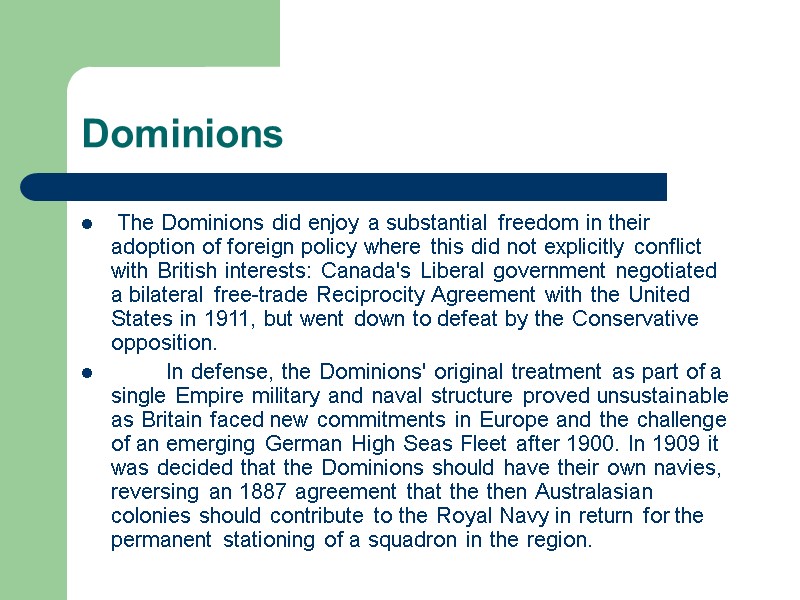
Dominions The Dominions did enjoy a substantial freedom in their adoption of foreign policy where this did not explicitly conflict with British interests: Canada's Liberal government negotiated a bilateral free-trade Reciprocity Agreement with the United States in 1911, but went down to defeat by the Conservative opposition. In defense, the Dominions' original treatment as part of a single Empire military and naval structure proved unsustainable as Britain faced new commitments in Europe and the challenge of an emerging German High Seas Fleet after 1900. In 1909 it was decided that the Dominions should have their own navies, reversing an 1887 agreement that the then Australasian colonies should contribute to the Royal Navy in return for the permanent stationing of a squadron in the region.
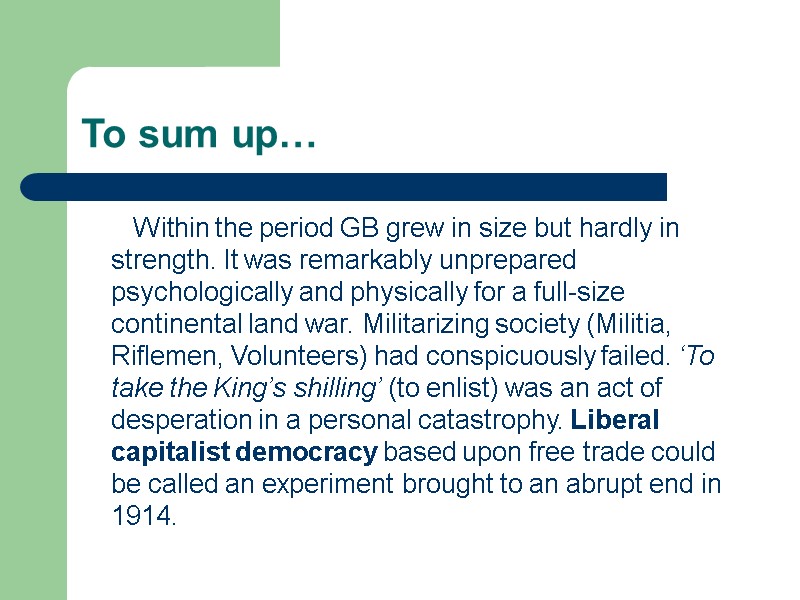
To sum up… Within the period GB grew in size but hardly in strength. It was remarkably unprepared psychologically and physically for a full-size continental land war. Militarizing society (Militia, Riflemen, Volunteers) had conspicuously failed. ‘To take the King’s shilling’ (to enlist) was an act of desperation in a personal catastrophy. Liberal capitalist democracy based upon free trade could be called an experiment brought to an abrupt end in 1914.
35704-liiberal+age.ppt
- Количество слайдов: 30

